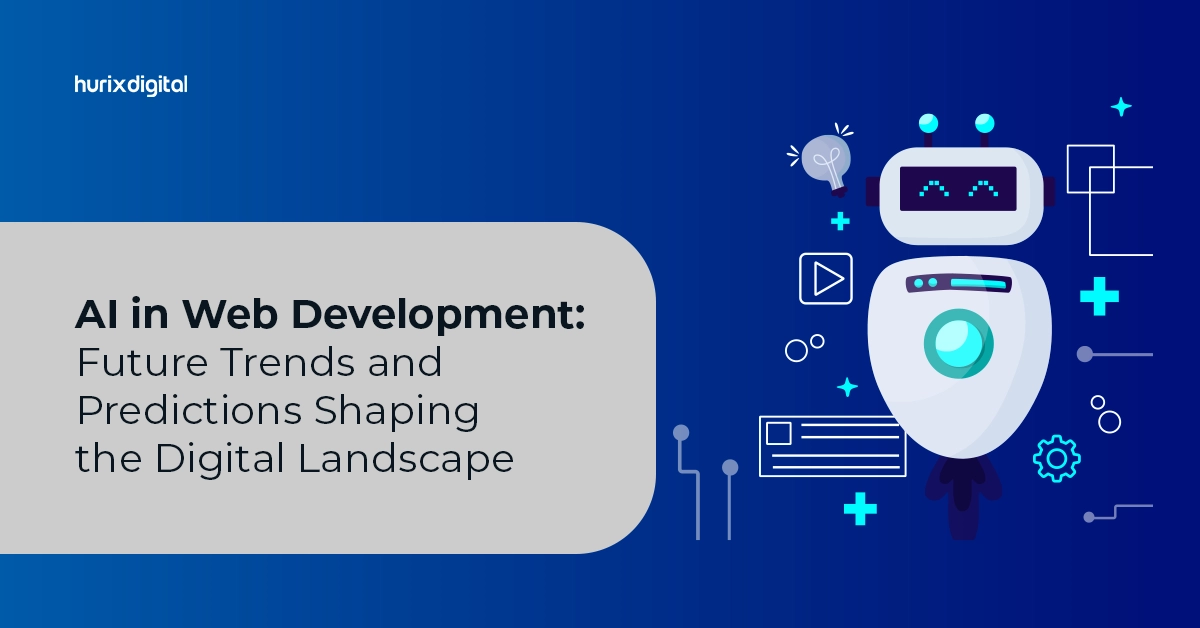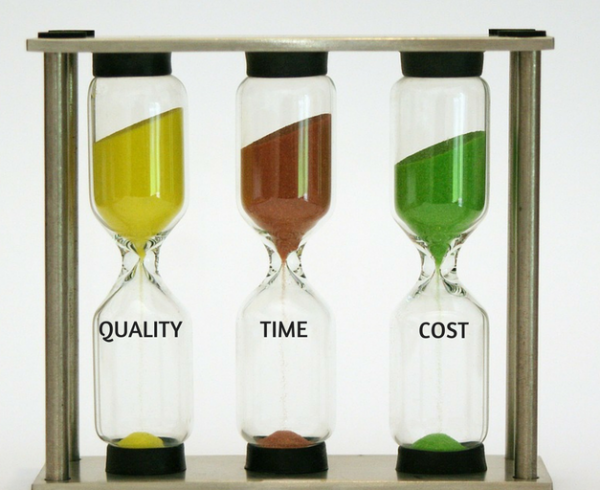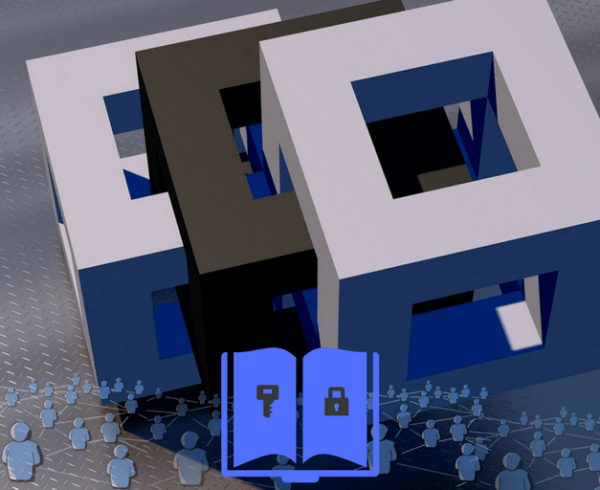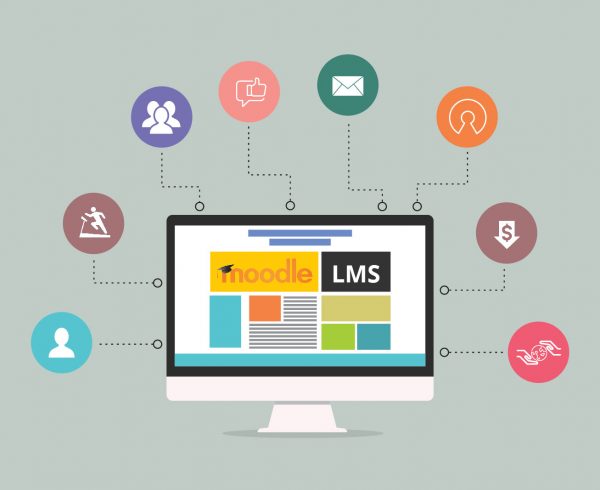The web development landscape is constantly evolving, and Artificial Intelligence (AI) is poised to become a game-changer now and in the years to come. The AI market is poised to show robust growth with a forecast of reaching nearly 20-fold growth of about USD 2 trillion by 2030.
From automating repetitive tasks to crafting personalized user experiences, AI’s impact is felt across all stages of web development, fundamentally reshaping the way we build and interact with websites.
Let’s delve into the exciting world of AI in web development and explore the trends and predictions that will define the future of this field.
Table of Contents:
- Revolutionizing the AI Web Development Process
- Future Trends of AI Web Development
- The Future is Now: Predictions in AI Web Development
- In Conclusion
Revolutionizing the AI Web Development Process
AI is about to fundamentally reshape the way you build websites, from conception to deployment:
- Code Completion and Bug Detection: Imagine AI assistants suggesting code snippets, automatically correcting syntax errors, and even identifying potential bugs before they appear. This will significantly boost developer productivity and efficiency, freeing up time for more strategic tasks.
- Automated Testing and Deployment: Time-consuming testing and deployment processes can be streamlined with AI-powered tools. These tools can automatically generate test cases, run them across various devices and browsers, and even deploy code updates seamlessly, ensuring a smoother development cycle.
- Content Creation and Optimization: AI can generate website copy, product descriptions, and even blog posts, tailored to specific audiences. It can also analyze user behavior and optimize content for better search engine ranking and engagement.
Also Read: Equalsense: Your Partner for AI-Powered Web Accessibility Solutions
Future Trends of AI Web Development
Imagine websites that learn your preferences, predict your needs, and build themselves. That’s the reality AI is bringing to web development. Explore the cutting-edge technologies and bold predictions that will reshape the way we interact with the online world.
Let’s explore the future of AI-powered websites and prepare for a revolution in online experiences:
1. Enhancing the User Experience
With AI’s help, the future of web development is all about tailoring experiences to each user, making every visit feel like a personal encounter with your brand. Discover how AI will create websites that anticipate needs, adapt to preferences, and increase user engagement like never before.
- Personalization at Scale: AI can personalize website content, recommendations, and even website layouts based on individual user preferences, browsing history, and real-time behavior. This will create a more dynamic and engaging experience for each visitor.
- Voice-Activated Interfaces: The rise of voice assistants like Alexa and Google Home will lead to a surge in voice-activated web applications. AI will power these applications, understanding natural language queries and providing relevant responses, making web interactions more intuitive and hands-free. This also helps in making web content more accessible to foster inclusion and cater to a more diverse set of users.
- Proactive Customer Support: AI-powered chatbots can handle basic customer inquiries, resolve issues, and provide 24/7 support, reducing reliance on human agents and improving customer satisfaction. In 2024, it has been predicted that 80% of businesses will be using chatbots and virtual assistants. Additionally, AI can analyze user sentiment and predict potential problems, enabling proactive interventions before they escalate.
2. Immersive and Interactive Experiences
Move over, flat screens and static pages! Imagine websites that respond to your emotions, adapt to your movements, and blur the lines between reality and virtual worlds. We’re talking mind-bending AR/VR experiences, AI-powered chatbots that become virtual companions, and AI-driven analytics that support you more than ever.
- Augmented Reality (AR) and Virtual Reality (VR): AI can power immersive AR and VR experiences directly within web browsers. Imagine virtual tours of products, interactive learning modules, or even personalized travel simulations, all accessible through your web browser with the help of AI. The market for AI in AR/VR experiences is forecasted to reach a whopping USD 452.33 billion by 2030.
- Adaptive Interfaces and Dynamic Content: AI can dynamically adjust website layouts, colors, and content based on user preferences, device capabilities, and real-time context. This will create more responsive and engaging experiences, regardless of the user’s device or environment.
3. Challenges and Considerations
While the potential of AI in web development is immense, it comes with its own set of challenges. Ethical considerations surrounding data privacy, bias, and job displacement must be addressed responsibly. Additionally, ensuring the security and robustness of AI-powered tools will be crucial.
- Bias: AI algorithms are trained on data, and that data can be biased. This can lead to discriminatory outputs in web applications, affecting user experiences and potentially causing ethical issues. Developers must ensure they use diverse and unbiased datasets to train AI models and implement safeguards against bias amplification.
- Black Box Problem: The inner workings of complex AI models can be opaque, making it difficult to understand how they arrive at certain decisions. This lack of transparency can be problematic in web development, where users need trust and accountability. Developers should prioritize explainable AI models and open-source solutions for greater transparency.
- Security and Privacy: AI-powered web applications often handle sensitive user data. This raises concerns about data breaches and privacy violations. Developers must prioritize robust security measures and ensure data is handled by relevant regulations like GDPR and CCPA.
- Job Displacement: Automation is a key benefit of AI, but it also raises concerns about job displacement in web development. Developers need to adapt and upskill to stay relevant in an AI-driven future, focusing on creative problem-solving and skills that complement AI, not compete with it.
AI has the potential to be a game-changer, but integrating AI tools requires careful consideration of the challenges and ethical implications. By addressing these concerns and prioritizing user trust, transparency, and responsible development, developers can harness the power of AI to create innovative and accessible web experiences for all.
The Future is Now: Predictions in AI Web Development
Despite the challenges, the future of web development is undeniably intertwined with AI. Embracing AI tools and techniques will enhance website functionality and user experience and empower developers to focus on creativity, innovation, and strategic problem-solving.
By harnessing the power of AI development tools responsibly, we can build a future web that is more dynamic, personalized, and engaging than ever before.
- AI-powered website builders will become mainstream, democratizing web development for non-technical users.
- AI will play a crucial role in developing websites for the emerging metaverse, creating immersive and interactive online experiences.
- The line between web development and data science will blur as AI becomes the driving force behind website personalization and optimization.
Also Read: How to Use Hybrid Apps to Improve Customer Engagement and Loyalty?
In Conclusion
AI in web development is not just a futuristic buzzword; it is the next wave of innovation transforming the landscape. By embracing its potential and addressing its challenges, we can unlock exciting possibilities and build a future web that is smarter, more intuitive, and more user-centric than ever before.
Know the full potential of your digital content with Hurix Digital’s AI-powered analytics and personalization tools. Schedule a demo today!











